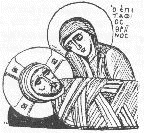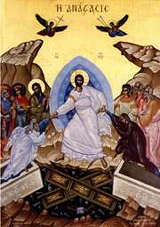Death & the Future Life
This section of the site concerns the entire Mystery of Death and the life after death. These are arguably two of the most important subjects a person can grapple with. Yet they are also subjects about which most people are very ill-informed. As Dr. Constantine Cavarnos points out in his excellent summation of this topic:
"The Orthodox Church has a full and very precise teaching on the questions of the constitution of man, the nature of the soul, the relationship between the body and the soul, the nature of death, Paradise and Hell, and the general destiny of man. This teaching is contained in the writings of the God-bearing Fathers and Teachers of the Church—most notably in the writings of the ascetics and mystics—, in the lives of the Saints, and in the Church's Hymnography and Iconography" (The Future Life According to Orthodox Teaching).
The purpose of this section of the site is to present the Orthodox Church's profound and deep understanding of the greatest tragedy to befall mankind: his estrangement (spiritual death) from God due to his Fall in Paradise, and the physical death and corruption of the cosmos (Romans 8:19) which followed.
Death is without doubt the most perplexing subject known to man. The wisest of the secular sages throughout the centuries of human existence have not been able to unravel, or fully reveal the cause and ultimate meaning of, this dilemma. Even less have they been able to help man to deal with it properly. "Only the Christian Faith, which holds fast to the word of the resurrection, offers a certain, a secure and a sure hope for victory over death. And this hope is a gift of God" (The Mystery of Death, p. 114).
We live in a society that worships the body and material possessions (vanity, hedonism, and materialism) and cares next to nothing for the soul. Suicide is near its all time high—especially among teenagers—because of the tremendous despair that is generated when a soul made in the image of God is confronted with the meaninglessness and fragmentation of life without God in the modern world. The Orthodox Church has an answer to all of these problems, and offers sure hope for those who are at the end of their rope and may be ready to take their own life. As our Lord once said, "For what is a man profited, if he shall gain the whole world, and lose his own soul?" (St. Matthew 16:26). If you, dear reader, are considering suicide, I encourage you to examine carefully the sure hope that our Lord Jesus Christ can give you in His Holy Church, His very Body!
Dedicated to Our Lord Christ Jesus"Who trampled down Death by death, and upon those in the tombs, bestoweth Life." |
We also live in a society in which most people have very confused and false understandings of the future life. From the popularity of "near-death experiences" (NDEs), to the typical Hollywood portrayal of bliss beyond the grave regardless of how one lived their life, most people embrace a mish-mash of notions about what is in store for them when their soul parts from their body. These false views of the future life serve to encourage man in his pride, vanity, and carelessness. Ideas have consequences, and these ideas have led innumerable souls to eternal peril. The rise of interest in NDEs over the past decade has not mitigated this problem, as Fr. Seraphim of Platina notes: "Needless to say, [traditional Orthodox writings on death] constitute a reading material infinitely more profound and more profitable than the popular 'after-death' books of our day, which, even when they are not merely sensational, simply cannot go much below the spectacular surface of today's experiences for want of a coherent and true teaching on the whole subject of life after death" (Preface to The Soul After Death).
For the Orthodox Christian, however, a proper understanding of the future life is essential to living in a God-pleasing, joyous, and fulfilled manner on earth. Orthodox understand that Hell is a choice; that a person's view of the future determines how he or she lives in the present; and that, as St. Isaac of Syria once said: "This life has been given to you for repentance; do not waste it in vain pursuits." Meditation upon one's own death and the Judgment that awaits him is not something that promotes morbid introspection, but rather the true repentance that leads to the fullness of life and joy in Christ. May this soon be your discovery as well.
A Few Words Concerning Orthodox "Death Literature", by Protopresbyter David Cownie, with Patrick Barnes.
Excerpts from the Evergetinos: Gleanings from the Desert Fathers on Death and the Future Life.
Death: A Source for Sound Philosophy, an excerpt from The Mystery of Death.
Christians Philosophize Creatively About Death, an excerpt from The Mystery of Death.
On the Remembrance of Death, by St. Ignaty (Brianchaninov).
The Memory of Death. How beneficial this is for Christians, and how unbelievers cannot understand this.
Excerpts from the Prologue From Ochrid: On Death and the Future Life
The Great Wager Between Believers and Unbelievers, by Photios Kontoglou
Let's Talk About Death, by a Nun of the Orthodox Church
"The Raven": Demon of Despair, by Presbytera Juliana Cownie. A very interesting article on Edgar Allen Poe, death, and despair.

From what we have written it is clear that the position of all the above on the subject of death lacks depth and weight. Secular philosophy admits its ignorance and its awe as it ponders the thick and impenetrable darkness that covers the life beyond the grave. The existentialists say that death is the end that reveals our finiteness. But these fashionable philosophers of our time are not right. Death is not the end; it is the beginning of the true life that awaits us beyond the grave, if indeed we have begun to live it here. Christ, "the resurrection and the life" (Jn. 11,25), came, was crucified, resurrected, ascended to heaven and waits for us there, as He assured us: "I go (to heaven) to prepare a place for you" (Jn. 14,2). Therefore, death does not reveal our finiteness; it reveals our infiniteness, our eternity. This is why the Christian meditates and ponders upon the mystery of death in a way that is productive, positive and dynamic. For this present life is an arena in which the great battle is waged for the sake of immortality and eternity.
—Nikolaos P. Vassiliadis, The Mystery of Death, p. 54.


